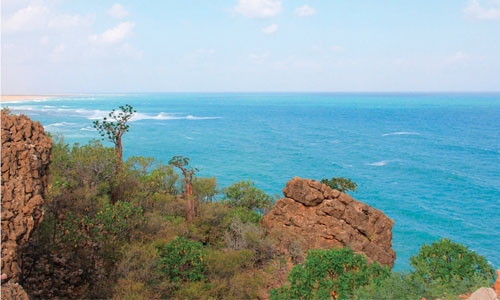Importance of preserving Socotra island
Manama : The long-neglected island Socotra is now home to a large number of endangered species wherein up to a third of its plant life is endemic and could be found nowhere else on earth but Socotra, revealed experts at a workshop held at the Arab Regional Center for World Heritage in Manama
The cultural heritage protection programme for the Yemeni island of Socotra was hosted by the Arab Regional Center for World Heritage in co-ordination with Centre for Middle Eastern Plants, Royal Botanic Garden Edinburgh with the support of British Council. The programme was aimed at integrating cultural heritage into conservation and development planning on Socotra.
The workshop that was launched in the presence of Yemeni Ambassador to the Kingdom Hassan Al Ahmadi is part of a two-year programme attended by six participants of heritage and community development workers in Socotra.
The workshop aims at qualifying the members and developing their abilities in the field of preservation of cultural heritage, an aspect that has not been emphasized in the development and conservation plans of the neglected island, which is home to exceptional natural species and moreover is a UNESCO World Heritage Site.
“Socotra has a cultural heritage no less important than its natural heritage. The long neglect towards the island has created a threat to the endangered flora and fauna in the island,” said Dr Alan Forest, from the Royal Botanic Garden Edinburgh.
“The Botanical field surveys led by the Centre for Middle Eastern Plants, part of the Royal Botanic Garden Edinburgh, showed the entire flora of the Socotra Archipelago has been assessed for the IUCN Red List and that 37% plant species on Socotra are endemic. Through this workshop, we are trying to create awareness among the people of the island to preserve and document the cultural heritage of the island which is also now a world heritage site,” Dr Alan added.
“Being the regional centre for the Arab region, through workshop we are trying to create awareness to the people of the island in order to preserve which is under threat either through neglect or due to conflict.”
“The important aim is to bring people of the island coming to Bahrain so that they can learn from experts to further take this expertise to the field and where the people could implement the course of action by themselves,” said Assistant Director of Arab Regional Center for World Heritage.
Ahmed al-Aqrabi, director of the office of the General Authority for Antiquities and Museums in Socotra Archipelago further stated, “The importance of cultural heritage in Socotra is directly linked to its natural importance. Many customs, traditions and professions have been established and cities have flourished in the archipelago as a major source of products such as dill, spices, honey and others.”
“Socotra has many monuments dating back to different periods of history, beginning with primitive drawings in more than 40 caves around the island and archaeological sites dating back to the Hadramout and Sabra civilizations and historic buildings dating back to the Islamic era, such as Al-Mahrien Castle,” Ahmed added.
The training program, which will run until March 1 will further include a series of intensive sessions in which they learn about the cultural and intangible heritage, world heritage and exceptional international value, as well as giving them an introduction on heritage protection and documentation, 1972 Convention on the Protection of Heritage in Times of Conflict, Convention on the Protection of the Heritage from Illegal Trade and others. Participants will also be trained to document heritage using photography and video filming.
The training programme will further include panel discussions, scientific dialogues of experts and specialists in the fields of conservation of natural and cultural heritage, and field visits to different parts of Bahrain. Participants will also learn to document heritage in various ways such as interviews, photography and other techniques.
The Arab Regional Center for World Heritage is working dedicatedly to preserve the neglected island which includes large numbers of plant species, reptiles, birds and marine animals that are not found anywhere else in the world and distinguish it from other natural sites.
Related Posts

